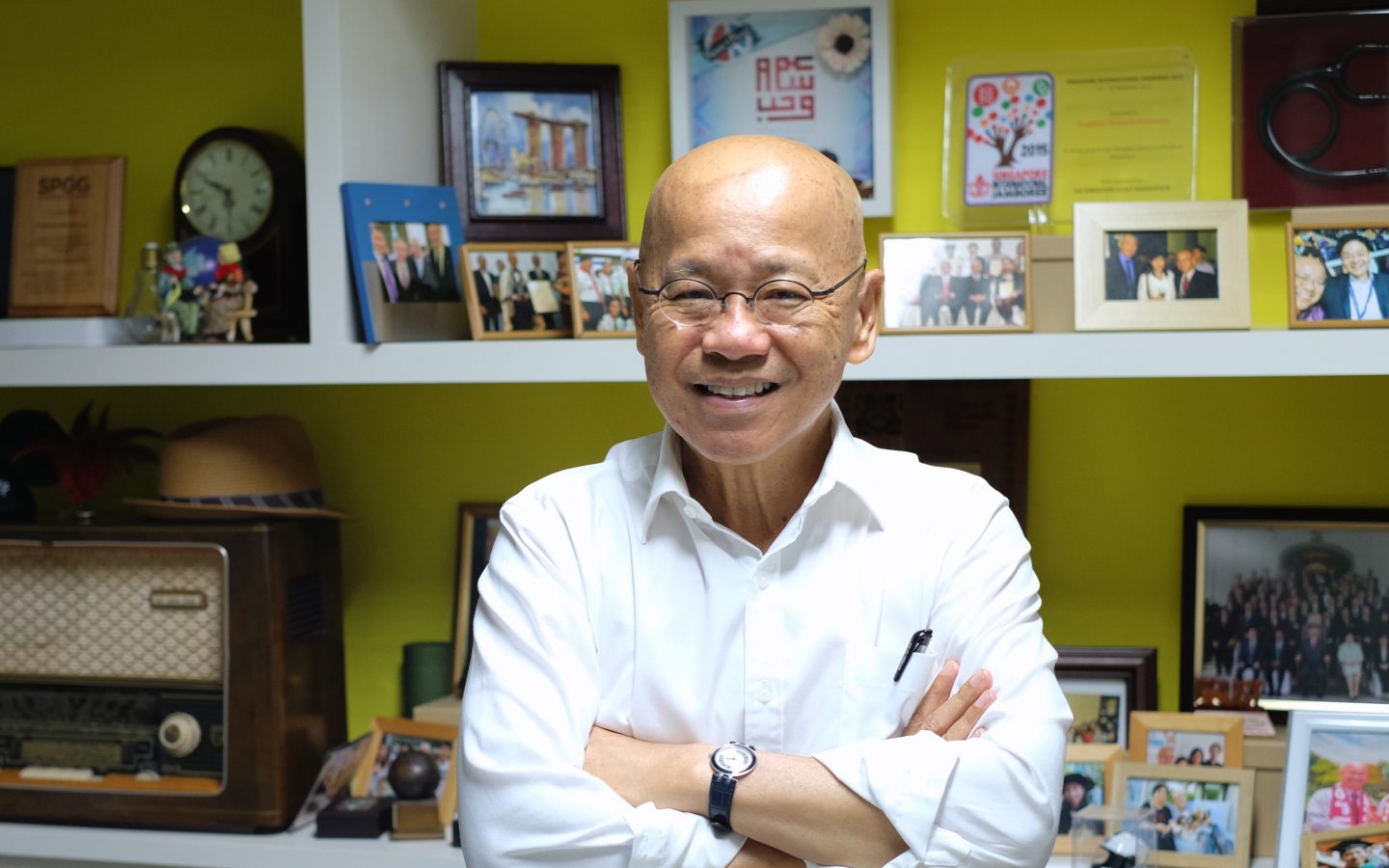“I offered to resign from my church”: The heartache Dr William Wan felt when his daughter strayed
by Christine Leow // July 16, 2021, 2:44 pm

Rev Dr William Wan learnt to let go and lean on God instead of blame himself when his daughter chose to leave school and move out of the home at just 16. Photo courtesy of Rev Dr William Wan.
Reverend Dr William Wan is a well-known figure in Christian circles.
Once a lawyer and a pastor of different churches abroad and in Singapore, he has also been involved in several non-profit organisations (NGOs) and continues to sit on many boards and committees of NGOs and government agencies.
Now 74, he is perhaps best known as the face and soul of the Singapore Kindness Movement, a non-government, non-profit organisation, registered charity and Institution of Public Character he started more than a decade ago.
What is less known is his journey as a father.
Dr Wan has three children all in their 40s and four grandchildren, the oldest three who are in their 20s and the youngest just three years old.
But it was his journey with one of his children that once brought him and his wife, Ruth, the most heartache.
Winsome and adorable
Their middle child was born in Canada while Dr Wan was a graduate student at Regent College. He had gone to further his education because he felt the call to full-time ministry.
There was nothing in her years growing up that would warn the Wans that she would, one day, turn her back on her family and all that they had taught her.
As a child, she was winsome and adorable, earning her the nickname “Roly Poly”. In school, she was an exceptional student who did so well she was put in advanced classes. She was very popular with her peers as well.
“My wife and I were not controlling. We gave our children a lot of room to think for themselves.
“We knew something was going wrong.”
“My responsibility as they were growing up was to read with them and put them to bed. We bought pictorial Bible stories for children and prayed with them every night before bed.”
In her teens, the family moved to Washington DC in the United States and their daughter was sent to the best high school in the district.
“It was an excellent school, quite a competitive school. Kids from that school tended to go to good universities.
“She was in the gifted programme.”
As with any school, though, there were those who did not follow conventions. At 14, their child fell in with a group who “rebelled against the middle-class syndrome”.
“Her grades started to free fall. She missed school and the school called us up many times for counselling. We knew something was going wrong.”
The once bubbly and chatty child was replaced by a sullen teen who wore black lipstick, shaved half her head, dyed the rest of her hair in rainbow hues, and had many piercings on her ears.
“She had chosen a punk lifestyle.”
“You know, you have been counselling other kids and other parents, you never really think it would happen to you.”
She would skip school and stay out late. When she was home, she would lock herself in her room to smoke and listen to heavy metal music. Her parents suspected she was experimenting with sex and drugs as well.
“We felt completely helpless,” said Dr Wan who was then pastoring a church.
“You know, you have been counselling other kids and other parents, you never really think it would happen to you.”
No amount of counsel could reach their child. Every attempt at engagement ended in quarrels. Eventually, she dropped out of school.
“One of my first reactions was to offer to resign from the church. I felt like I was not suitable to be a pastor. I couldn’t take care of my own kids. I thought maybe I had failed (as a father).”
The reaction of his committee of leaders was full of grace.
“They laughed and said, ‘If that were the case, all of us need to resign because all of us have had kids who have rebelled.’
“They were quite encouraging.”
The worst was yet to come
On the morning of her 16th birthday, their daughter asked to leave home. She told her parents that since she was now legally an adult, she wanted to go to Canada to live on her own.
She asked them to give her a ride to the bus station.
“She didn’t ask us for anything else,” said Dr Wan.
No amount of persuasion could get her to change her mind. She had it all planned out. She had friends in Canada. She would get a job.
“I know you care for me but I have to find my own way.”
“She told us that staying with us was creating a lot of pain for us because of her lifestyle.”
The next day, the Wans took their daughter to the Greyhound Bus Station and saw her off.
“We had to let her go because the more you fight, the worse it would be. She wasn’t going to listen to us.
“She said, ‘It’s not your fault. It’s just me. I know you care for me but I have to find my own way to grow up. This is my way.’”
For months after that, Dr Wan’s wife Ruth would go to their daughter’s room and cry, plagued by guilt and wondering if they had either not done enough or had done something wrong.
The road home
Though their daughter did not want to live at home, she did not cut off ties with her family.
Several weeks after she went to Canada, she contacted her parents to tell them she was doing fine and that she had gotten a job as a waitress at a restaurant. She also planned on going to high school to complete her diploma.
“She didn’t mind keeping in touch. We would be on the phone, we would email. I was also on the board of an organisation near where she was so I would visit her twice a year.”
Not once did their daughter ask them for help though she was making only enough to just stay above the poverty line.
“I honoured her but I did not honour her lifestyle.”
“We had to trust God. I couldn’t be where she must go but God is there. So, you get down on your knees and commit it all to the Lord.”
This would go on for three years.
When their daughter was 20, she called her father one day to tell her that she was pregnant. By then, Dr Wan had returned to Singapore. She asked him to officiate at her wedding.
“She could have asked any licensed solemniser to marry her.
“The fact that she asked me showed that she respected me as a pastor and a father, and that she wanted me to be involved in a very important day of her life.”
He agreed to conduct a civil wedding for them.
“I made the condition very clear to her that her chosen lifestyle is not consistent with the Christian teaching. It has to be a civil ceremony.
“So, I honoured her but I did not honour her lifestyle.”
It was not what the Wans would have wanted for their child. Their daughter was five months pregnant at the wedding and most of the guests were teens high on drugs.
“We were prepared for the worst, but we always hoped for the best.”
But what should have been the low point in their journey with their daughter turned out to be a blessing in disguise, a term Dr Wan used. Within three years, the marriage fell apart.
That was when she told her parents she realised they had been right all along and that she “wanted to make them happy again”.
“We thought, ‘This may be the answer to our prayers.’”
Their daughter returned to school while caring for her son. Today, he is 25 and she has a PhD from Dalhousie University in Halifax, Nova Scotia, Canada.
It was a seven-year wait but the prodigal returned. Dr Wan now considers her the most affectionate of his three children.
“Once we made up our minds that we were committing her to the Lord, we were prepared for the worst, but we always hoped for the best.”
Lessons from the prodigal
In sharing his story, Dr Wan has always shared the lessons he has learnt as well.
Lesson 1: We are not in control, God is
“It’s self-deception to think that we have control over our children, our own destiny.
“Believe in a good God who will make something so painful good in the end.”
“Only God is in control and God has His own sovereign will.”
He admitted that it was a humbling insight but one he needed to have.
“God has a purpose and I work on the understanding that all things work together for the good of those who love Him (Romans 8:28) and that He will make all things beautiful in His time (Ecclesiastes 3:11).
“There is no other option but to believe in a good God who will make something so painful good in the end.”
Lesson 2: Love unconditionally
“Just because she is not listening, fighting you, or she is gone, never stop loving. Keep communication lines open.”
“Take comfort that God has given you a very intelligent kid.”
Dr Wan encouraged parents to “find ways to talk about the things they want to talk about” instead of harping on things they have done wrong because that would only push the prodigal away.
“When my daughter told me her marriage had failed and that she wanted to leave the man, I didn’t say, ‘I told you so.’”
Dr Wan also had a word of hope for parents: “Kids who rebel are actually very intelligent. Such people are usually leaders. They have a mind of their own.
“Take comfort that God has given you a very intelligent kid.
“If this kid can come out of it, he or she will be used by God.”
Lesson 3: Pray unceasingly
Though they could not reason with their daughter, they could pray for her. That was what the Wans did continuously.
Lesson 4: Have faith in foundations
“If you have spent your time with your kid when they are young – birth to 12 – and invested your emotional energy, your spiritual teaching and you have laid a good foundation, then the Scripture will come to pass. He will come back (Proverbs 22:6).”
Dr Wan recounted how, even when his daughter was going her own way, she still exhibited some of the values they had imparted to her.
“She was learning pottery from my friends while she was astray. My friend said she had very good work ethics.”
Lesson 5: Wait patiently
“The Bible tells us that, in God’s eyes, a thousand years is like a day (2 Peter 3:8). What is time to God?
“Learn patience. As long as our kid is alive, God is still at work in the person. It may take 10 years, 15 years.
“Don’t try to determine the timing of the solution or the timing of God’s deliverance by our own reckoning. It has to be God’s reckoning.”
Lesson 6: Empathy out of suffering
“I have become more empathetic with regards to parents who have children who stray. I used to be self-righteous.
“Now I know: You can do everything right and it can still go wrong.”
Dr Wan cited the example of Joseph who, from the time he was in the house of Potiphar, did everything right and things still turned out very wrong for him.
Salt&Light Family Night: Help, my child is leaving the faith
The son you took to service every week tells you he “no longer believes in your God”.
The daughter who used to play keyboard for the worship team won’t step into church anymore.
That child who once knew every answer at Sunday School now wants nothing to do with Christianity.
These are familiar scenarios, all too painful for many families who have raised their children up in the faith.
Local statistics paint an equally sober picture. In the 2020 population census released in June, it was reported that 24.2% of those aged 15 to 24 said they had no religion, a marked increase from the 17% a decade ago.
Are we losing our children? How do we impart a faith to them that will hold? How do we bring back our prodigals?
Join hosts Carol Loi and Alex Tee, as well as panellists who have their own personal story to tell of prodigals finding their way home.
- Dr William Wan, Secretary General of the Singapore Kindness Movement
- Edric Sng, Deputy Senior Pastor of Bethesda (Bedok-Tampines) Church (BBTC)
- June Chuah, missionary
Date: July 27, 2021
Time: 8.30pm-10pm
Cost: Free
Register at: http://bit.ly/SLFamilyNight27July
RELATED STORIES:
Love them, just love them: The missionary couple who prayed their prodigal children home
We are an independent, non-profit organisation that relies on the generosity of our readers, such as yourself, to continue serving the kingdom. Every dollar donated goes directly back into our editorial coverage.
Would you consider partnering with us in our kingdom work by supporting us financially, either as a one-off donation, or a recurring pledge?
Support Salt&Light


